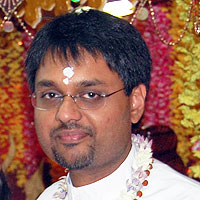From a satsang with Pt. Dr. Umesh Persad, Spiritual Leader, SWAHA Gyaan Deepak Kirtan Mandali
All our spiritual practices and knowledge point us towards the supreme state where we understand and experience that we are one with divinity. Once there was a monk, who was playing ‘catch’ with his dog when a younger monk approached him. He asked the older monk for an explanation on the many scriptural teachings and practices, which he found confusing. The older monk pointed to the moon and asked the dog to fetch it. The dog remained still, looking at the monk’s finger. The older monk explained, “I asked the dog to fetch the moon, but he just sits and stares at my finger. Similarly, all the practices and teachings just point us towards the experience of the truth: what you read or hear about it. The most important thing is the individual experience and inner knowing of the Self.”
Kabir, the Indian poet and saint, also urges that we make every effort to merge ourselves in that one Supreme Being. To Kabir, the world is a depressing place, filled with suffering. He sees that we all swivel between two opposites: the sky and the earth, the past and the future, happiness and sadness. He advises that everyone will one day leave this earthly existence: both the king and the beggar, those in positions of power as well as those who are bound in chains. The end result is the same for all. Therefore, with this in mind, we must treat everyone well. We must also focus on ourselves and understand the reality of impermanence in the world. In this regard, we are similar to the leaves on a tree. We might grow next to each other during life, but one day we will all fly away in the wind.
Kabir teaches that understanding the transience of life is the route to true happiness. Normally, during challenging times, everyone remembers God, but when we are happy, we enjoy life without remembering that it is temporary. However, if we remember God, the Supreme Being and our true nature at all times, then we might not even have challenging times. In other words, peace and evenness of mind are important. Then, whether the circumstances are good or not, that individual is stable in the mind. To attain stability of mind, we must know who we are in reality at all times.
It is said that the water that flows everywhere becomes purified when it reaches the Ganga River. It then flows into the ocean and becomes the ocean. At that point, the idea of pure, impure and separate no longer exist. Kabir urges that we try to merge ourselves in that one Supreme Being. The divine is always present but we are not aware of it and do not experience it. We must take that inward journey deep within the subtle self, which is our true nature. Like the monk, he urges that we treat everyone in this world with love and respect. We must see everything and everyone as a form of oneself, as we do not know the form in which we might meet the Lord.
Brahmananda expounds on the simplest, sweetest means of reaching the Self. The self or spirit is not a thing that we can see, feel or touch; it is beyond the mind and senses. He advises that we should search for Rama, that which shines within, as the abode of happiness. The eternal Rama within us brings fulfilment, peace and ‘desirelessness’. In other words, paradoxically, all our desires are fulfilled when we have no more desires. He advises that in order to free ourselves from bondage to this world, we must associate with truly spiritual people. Then, we should chant and immerse ourselves in His name until the mind is completely dissolved. The sense of an individual self will then disappear and only the eternal, pure Rama, the shining self, and our true nature, will remain.



